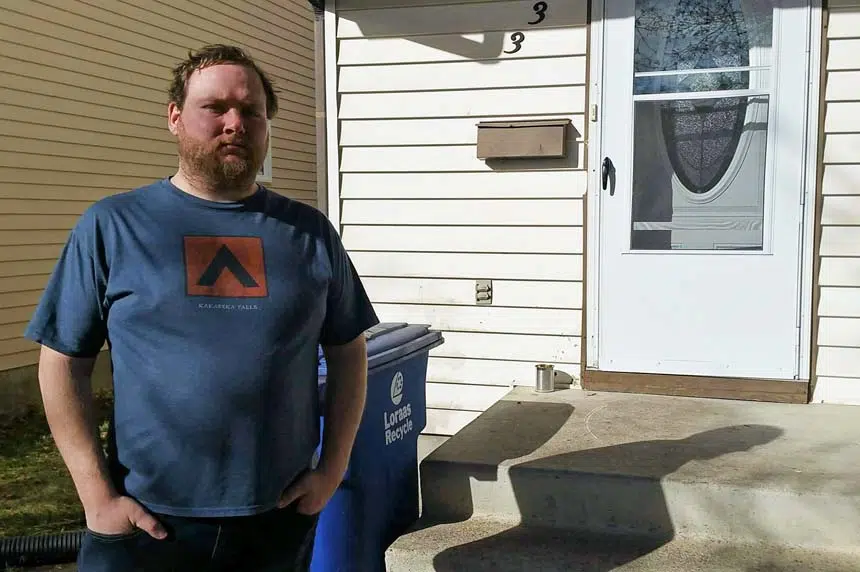A Saskatoon landlord says he’s upset with Social Services after tenants trashed his rental property.
Aaron Driol said he rented half his duplex in the Silverwood Heights neighbourhood to a mother and her two adult sons back in September 2016. All three were on social assistance.
He said their references checked out and things seemed fine.
“Everything that I got told was that they were extremely clean, they were quiet and respectful and everything else like that,” Driol said.
Shortly after they moved in, Driol said one of the sons told him he’d won custody of his one or two-year-old child. Driol said he had misgivings about three adults and a toddler sharing 1100-square feet of space, but wanted to be kind.
He said other issues began to pile up, from loud music and an unkempt yard, to smoking in the suite — which was forbidden under the tenancy agreement.
By September 2017, Driol said he found his tenants had moved another three adults and another toddler into the unit.
“They didn’t even come and speak to me about it,” he said.
At that point, he said he issued them with an eviction notice.
When move-out day came at the end of September, he said his tenants delayed their walk-through until past 11 p.m. then simply took off. They left the lights on, the doors wide open and a massive mess for him to discover.

Aaron Driol photographed damages to his property after evicting tenants on Sept. 30, 2017. (Submitted photo)
Driol said he found mountains of trash and cigarette burns and holes dotting the walls. He said his appliances were ruined, with the fridge full of mold and the heating elements on the stove and in the oven so caked with filth they’d stopped working.
“I had to haul probably 120 pounds’ worth of some random meat out of the basement that they’d just left sitting on the floor,” he said.
Driol said he’d barely slept in the week since he first surveyed what he estimated at over $10,000 in damage.
“I pretty much came back to my house and I sat on my couch and I kind of almost had a breakdown. It was heartbreaking. This duplex has been in my family for three generations now,” he said.
On top of everything, Driol said he and his wife had just about cleared off their wedding debt after being married in August.
“We were actually hoping to take an official honeymoon here in the spring. But because of all this it’s probably not going to happen now,” he said.
Driol said he contacted Social Services, but was informed they wouldn’t do anything beyond pay out the $1,450 damage deposit they’d provided letters of guarantee for. He said the Office of Residential Tenancies didn’t have much help to offer either.
“I feel like I’m contantly against a wall right now,” he said. “I’m being ping-ponged around by people who say ‘It’s not our problem,’ or ‘We only cover this much.'”

Aaron Driol photographed damages to his property after evicting tenants on Sept. 30, 2017. (Submitted photo)
In the meantime, he said he feels like his own tax dollars were used to lure him into renting to people who have nearly obliterated any profit he made since he took the property over from his parents a few years ago.
“If people that are on social assistance are getting this free money, basically, and they’re being able to rent out places like mine … and they’re causing this much damage — in my opinion, they shouldn’t be allowed to have that funding,” he said.
Driol said he hoped other landlords would see his story as a cautionary tale to vet prospective tenants carefully and make sure they stay on top of any issues that might arise after people move in.
“I understand that (Social Services) don’t want to kick these people out to the cold. But how is it fair to me as a landlord to have to lose $10,000, or whatever thousands of dollars in repairs?”
Social Services responds to concerns
Alan Jones, director of income assistance for the Ministry of Social Services’ north region, said about 35,000 households get some form of support when it comes to paying rent.
He said a typical family with two kids in Saskatoon would receive just over $700.
While there are cases where the ministry controls a clients’ rent money if they have shown difficulty managing it themselves, Jones said these cases are not the norm.
“Our preference is that we would provide the assistance to the applicant and encourage them to go pay their rent to their landlord, similar to what you or I would do,” he said.
With that in mind, Jones said problems between people on assistance and their landlords really aren’t any different from typical disputes with unassisted tenants.
“Typically that relationship between a tenant and a landlord is a unique relationship that we try to stay away from as much as we can,” he said.
Jones said the ministry does track when it has to pay out damage deposits. He said they try to help clients address lifestyle issues that may make them problem tenants, but don’t typically cut off benefits.

Aaron Driol photographed damages to his property after evicting tenants on Sept. 30, 2017. (Submitted photo)
“Typically we wouldn’t take that hard line because, especially with the months coming ahead, it’s going to be cold,” he said, adding that stable housing allows clients to better care for children and look for work — both things that tend to reduce burdens on the system.
“We want to ensure that people can maintain their housing and not be at constant risk. But I recognize landlords do face challenges in this regard,” he said.
In a follow-up email, the Ministry of Social Services reported out of 10,143 guaranteed security deposits issued to landlords in 2015-16, 3,415 were paid out to landlords.
650 CKOM couldn’t reach Driol’s former tenants for comment.







